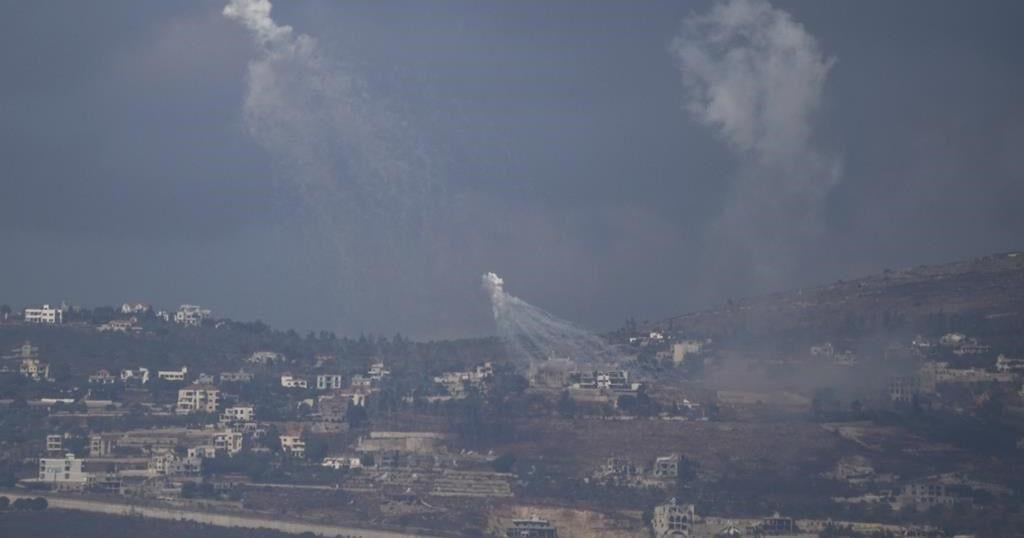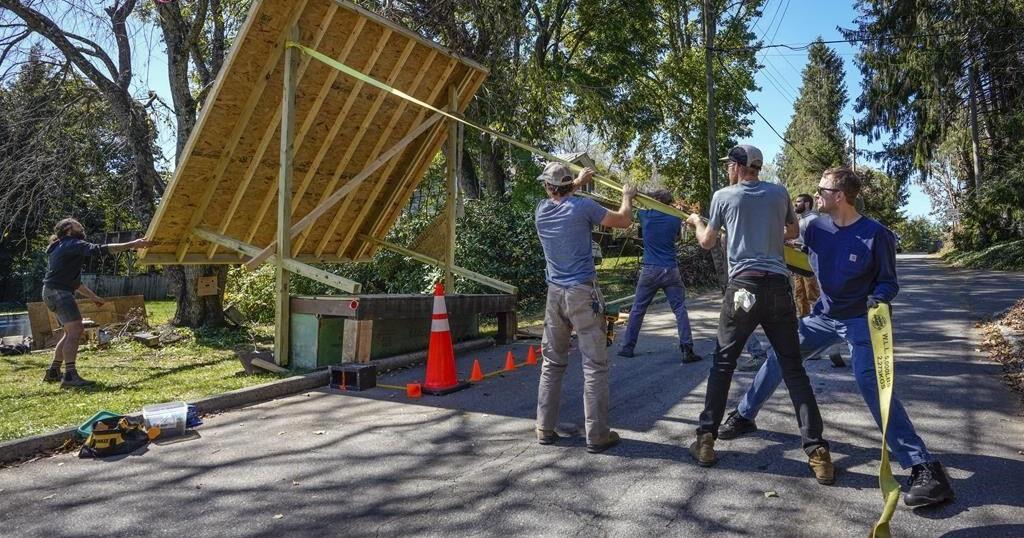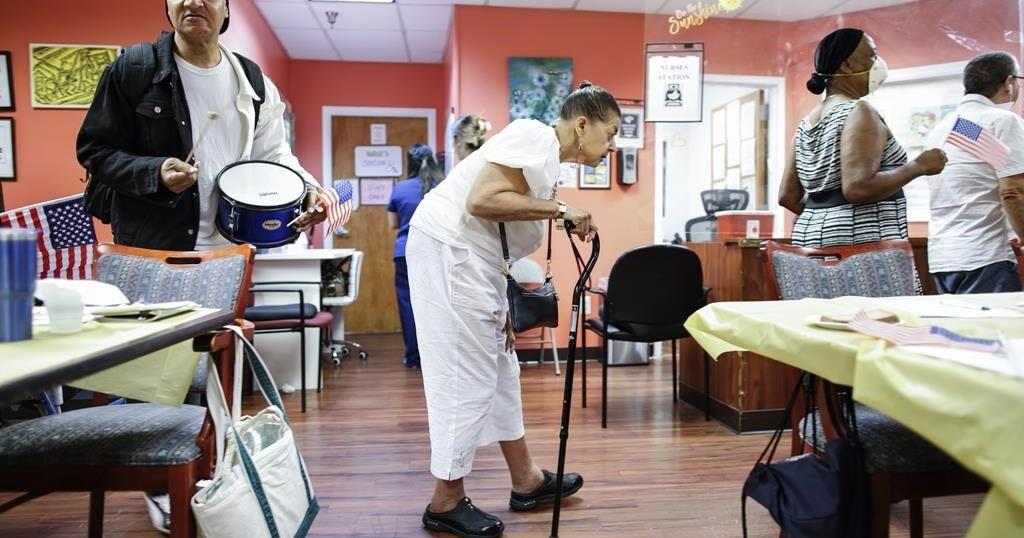JERUSALEM (AP) — Israel warned Lebanese people to evacuate border communities Tuesday to avoid harm from limited ground operations it said were launched against Hezbollah, and said it would retaliate if Hezbollah ally Iran launched a missile attack on Israel that a senior U.S. official said could come “imminently.”
Israeli airstrikes and artillery fire pounded southern Lebanese villages where people were ordered to evacuate, and Hezbollah militants responded by firing a barrage of rockets into Israel. There was no immediate word on casualties as fighting intensified and concerns of a wider regional war grew.
A U.S. official warned of “severe consequences” should Iran launch a ballistic missile against Israel. U.S. ships and aircraft are positioned in the region to assist Israel in the event of an attack from Iran, which a second official said could happen tonight. Both officials spoke on condition of anonymity to discuss intelligence.
Israeli military spokesman Rear Adm. Daniel Hagari also warned of consequences if Iran fired missiles into Israel. Iran’s state media has not suggested an attack is imminent, and Iranian officials could not be immediately reached for comment.
White House officials did not immediately offer any evidence backing the intelligence finding.
Iran launched an unprecedented direct attack on Israel in April, but few of its projectiles reached their targets. Many were shot down by a U.S.-led coalition, while others apparently failed at launch or crashed in flight.
While Hezbollah denied Israeli troops had entered Lebanon, the Israeli army announced it had also carried out dozens of ground raids into southern Lebanon going back nearly a year. Israel released video footage purporting to show its soldiers operating in homes and tunnels where Hezbollah kept weapons.
If true, it would be another humiliating blow for Iran-backed Hezbollah, the most powerful armed group in the Middle East. Hezbollah has been reeling from weeks of targeted strikes that killed its leader, Hassan Nasrallah, and several of his top commanders.
On Tuesday morning, Israel warned people to evacuate to the north of the Awali River, some 60 kilometers (36 miles) from the border and much farther than the Litani River, which marks the northern edge of a U.N.-declared zone intended to serve as a buffer between Israel and Hezbollah after their 2006 war.
The border region has largely emptied out over the past year as the two sides have traded fire. But the scope of the evacuation warning raised questions as to how deep Israel plans to send its forces into Lebanon.
An Israeli airstrike hit a residential building near Beirut Wednesday, causing damage and blowing out windows in the area. The strike appeared to hit an apartment about 100 meters from the Iranian Embassy. There was no immediate word on casualties.
Anticipating more rocket attacks from Hezbollah, the Israeli army announced new restrictions on public gatherings and closed beaches in northern and central Israel. The military also said it was calling up thousands more reserve soldiers to serve on the northern border.
Questions raised over whether Israeli forces entered
An Associated Press reporter saw Israeli troops operating near the border in armored trucks, with helicopters circling overhead, but could not confirm ground forces had crossed into Lebanon.
Ahead of the Israeli announcement of an incursion, U.S. officials on Monday said Israel had described launching small ground raids inside Lebanon as it prepared for a wider operation.
Neither the Lebanese army nor a U.N. peacekeeping force that patrols southern Lebanon have confirmed that Israeli forces entered. The U.N. force said a cross-border operation would be a violation of Lebanese sovereignty.
Hezbollah spokesman Mohammed Afif dismissed what he said were “false claims” of an Israeli incursion. He said Hezbollah is ready for “direct confrontation with enemy forces that dare to or try to enter Lebanon.”
Hagari, the Israeli military’s top spokesperson, claimed troops were conducting “localized ground raids” on Hezbollah positions in southern Lebanon to ensure Israeli citizens could return to their homes in the north.
“We’re not going to Beirut,” he said.
He said Israel had carried out dozens of small raids inside Lebanon since Oct. 8, when Hezbollah began firing rockets into Israel after the outbreak of the war in Gaza.
He said Israeli forces had crossed the border to collect information and destroy Hezbollah infrastructure, including tunnels and weapons. Israel has said Hezbollah was preparing its own Oct. 7-style attack into Israel. It was not immediately possible to confirm those claims.
An Israeli military official said troops taking part in the latest incursion were within walking distance of the border, focused on villages hundreds of meters (yards) from Israel. The official, who spoke on condition of anonymity in line with military regulations, said there had been no clashes with Hezbollah fighters.
The Israeli military was accused of lying to media in 2021 when it released a statement implying that ground troops had entered Gaza. The military played down the incident as a misunderstanding, but well-sourced military commentators in Israel said it was part of a ruse to lure Hamas into battle.
Israel strikes more targets and Hezbollah fires rockets
An Israeli military official said Hezbollah had launched rockets at central Israel, setting off air raid sirens and wounding a man. Hezbollah said it fired salvos of a new kind of medium-range missile at the headquarters of two Israeli intelligence agencies near Tel Aviv.
Afif, the Hezbollah spokesman, said the missile attack “is only the beginning.”
The Israeli military official said Hezbollah had also launched projectiles at Israeli communities near the border, targeting soldiers without wounding anyone.
Hezbollah began firing rockets into northern Israel shortly after Hamas’ Oct. 7 attack into Israel ignited the war in Gaza. Israel has launched retaliatory airstrikes and the conflict has steadily escalated. In recent weeks Israel has unleashed a punishing wave of airstrikes across large parts of Lebanon.
Hagari said the U.N. Security Council resolution that ended the 2006 Israel-Hezbollah war had not been enforced and that southern Lebanon was “swarming with Hezbollah terrorists and weapons.”
That resolution called for Hezbollah to withdraw from the area between the border and the Litani River and for the Lebanese army and U.N. peacekeepers to patrol the region. Israel says those and other provisions were never enforced. Lebanon has long accused Israel of violating other terms of the resolution.
Israeli official says no plans to march on Beirut
The military statements indicated Israel might focus its ground operation on the narrow strip along the border, rather than launching a larger invasion aimed at destroying Hezbollah, as it has attempted in Gaza against Hamas.
Hezbollah and Hamas are close allies backed by Iran, and each escalation has raised fears of a wider war in the Middle East that could draw in Iran and the United States, which has rushed military assets to the region in support of Israel.
Israeli strikes have killed over 1,000 people in Lebanon over the past two weeks, nearly a quarter of them women and children, according to the Health Ministry. Hundreds of thousands have fled their homes.
Hezbollah is a well-trained militia, believed to have tens of thousands of fighters and an arsenal of 150,000 rockets and missiles. The last round of fighting in 2006 ended in a stalemate, and both sides have spent the past two decades preparing for their next showdown.
Recent airstrikes wiping out most of Hezbollah’s top leadership and the explosions of hundreds of pagers and walkie-talkies belonging to Hezbollah indicate Israel has infiltrated deep inside the group’s upper echelons.
The group’s acting leader, Naim Kassem, said in a televised statement Monday that Hezbollah commanders killed in recent weeks have already been replaced.
As the fighting intensifies, European countries have begun pulling their diplomats and citizens out of Lebanon.
___
Mroue reported from Beirut and Madhani reported from Washington. Associated Press writers Kareem Chehayeb in Beirut and Zeke Miller and Lolita C. Baldor in Washington contributed.
___
Follow AP’s war coverage at























